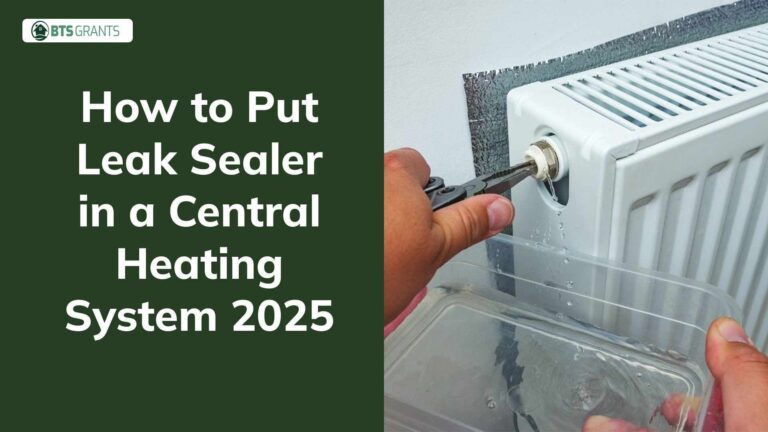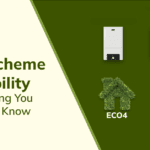![]()

If you’re using an outdated, inefficient back boiler, the Back Boiler Removal Grant under the ECO4 scheme can help you replace it. This grant is available to homeowners in England, Scotland, and Wales, covering the cost of removing your old boiler and contributing to installing a new, energy-efficient system.
You can install an A-rated gas boiler for those connected to mains gas. If not, you could benefit from a heat pump installation.
Replacing your back boiler with an efficient model reduces energy bills and your carbon footprint. It also increases your home’s energy efficiency, making it safer and more affordable to heat. Thankfully, under the UK’s ECO4 initiative, many homeowners may qualify for a free boiler scheme.
This guide explains the back boiler replacement grant, how to apply, the eligibility criteria, and the benefits for your home.
What is a Back Boiler?
Back boilers, also known as solid fuel back boilers, were commonly used in central heating systems from the 1960s to the 1980s. These compact systems were usually placed behind a fireplace or stove, drawing from the flame to offer district heating and hot water. They quickly became popular because they could easily be hidden behind the fire.
They are now outdated and inefficient, thanks to the continued improvements made in heating technology. If your home still has one of these systems, it’s probably an aged open-fire back boiler. These units are rarely manufactured anymore and were officially banned for new installations after the 2005 Building Regulations came into effect.
(Modern regulations mean new boilers must be at least 86% efficient; older back boilers have efficiency ratings of only 50%-70%.)
As a result, back boilers are frequently replaced with condensing boilers or renewable energy technologies, which burn less fuel, emit fewer emissions, and provide increased heating efficiency. Modern systems (92-14% rating) are also more energy efficient and incorporate far superior safety features than old back boilers, so they’re safer, too.
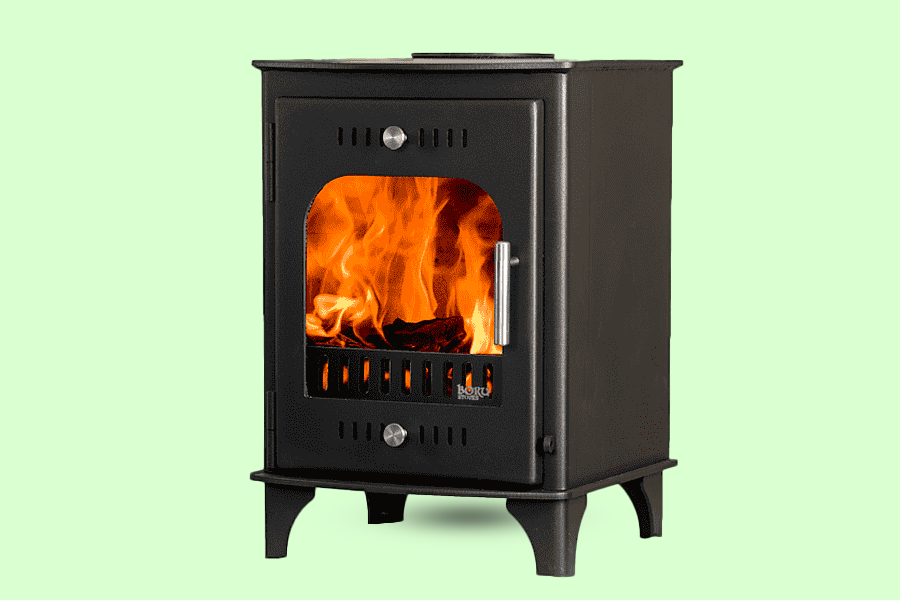
Drawbacks of Back Boilers
- Rising Energy Costs: Back boilers use more energy, significantly affecting your home’s performance and increasing energy costs.
- Heating Capacity: These systems often struggle to keep multiple rooms warm at once reliably.
- Maintenance Problems: Fixing old boilers can be both costly and time-consuming.
Applying for a Government Free Boiler Scheme is an affordable way to remove a back boiler to an energy-efficient heating system and reduce carbon emissions simultaneously.
What Is the Back Boiler Removal Grant?
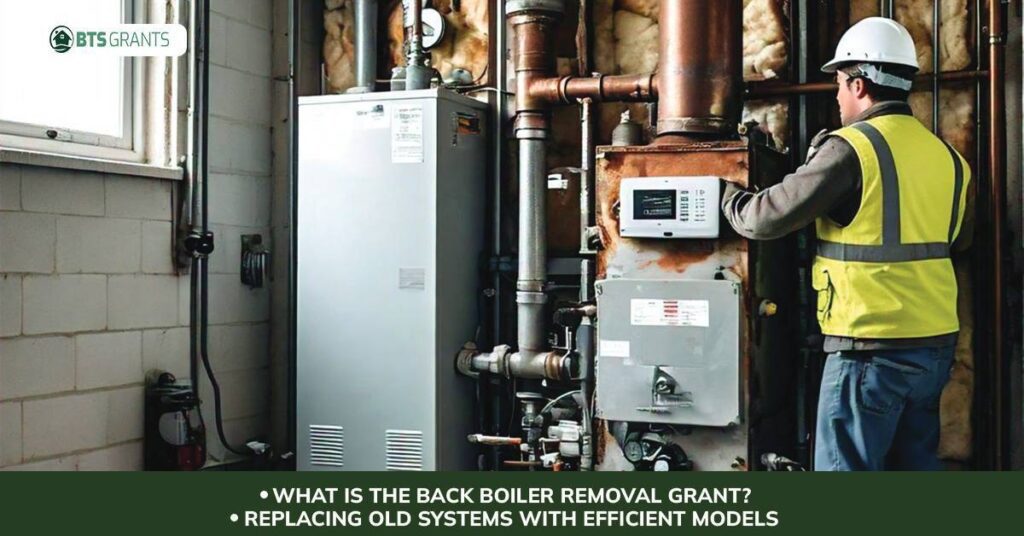
Removing a back boiler through the ECO4 grant ensures homeowners no longer rely on outdated, inefficient heating systems. They also assist low-income families (earning less than £31,000 a year) or those receiving benefits in removing outdated back boilers. This is to help and assist eligible homeowners and tenants to upgrade to new energy-efficient gas-condensing (combi, system, or regular) boilers.
Back boiler replacement grants are designed to improve energy efficiency and help combat fuel poverty across the UK. To qualify, homeowners and private tenants must meet specific eligibility criteria, such as having an old back boiler heating system, receiving government benefits, or falling under the low-income category. The back boiler grant covers the removal cost and supports back boiler replacement with a modern, eco-friendly heating solution.
Back Boiler Removal Grant Eligibility: Are You Eligible?
Back boiler removal grant eligibility depends on several factors, including location, property type, and financial situation. Usually, the requirements to be eligible for a government-funded replacement grant for a back boiler are:
- Property Ownership
You’ll need to be a homeowner or a private tenant to qualify. Private tenants will require their landlord’s consent before proceeding with any grant application. - Boiler Age and Efficiency
To qualify for a back boiler removal grant, your boiler must be old, inefficient, and typically installed before 2005. - Income Criteria
Eligibility often requires applicants to receive certain government benefits or have a household income below £31,000 per year. This ensures the grant targets low-income families who need the financial support most. - Energy Efficiency of the Home
Homes with poor energy efficiency ratings are prioritized for grants. ECO grants will be available for any property with the EPC (Energy Performance Certificate) rating of E, F, or G. - Type of Heating System
The back boiler replacement scheme helps families rely on outdated back boilers. The eco boiler grant will replace these old, inefficient back boiler systems with modern, energy-efficient ones.
Qualifying Benefits for a Back Boiler Replacement Grant
If you receive any of the following government benefits, you may qualify for a back boiler replacement grant under the ECO4 scheme:
- Income-Based Jobseeker’s Allowance (JSA)
- Income-Related Employment & Support Allowance (ESA)
- Income Support (IS)
- Pension Credit Guarantee Credit
- Working Tax Credit (WTC)
- Child Tax Credits (CTC)
- Universal Credit (UC)
- Housing Benefit
- Pension Credit Savings Credit
Why Replace Your Back Boiler?
Back boilers, once a popular heating solution, are now outdated. Here’s why replacing a back boiler is a smart choice:
- The Higher Running Costs
Replacing a back boiler can reduce energy expenditure from £1 to just £0.70 per £1 energy when it comes to back boilers that do not work efficiently. - Inefficiency
Replacing old back boilers can reduce energy bills by up to £630 a year compared to old models. - Regulation
New installations of back boilers were illegal in 2005, as they provided low energy efficiency & carbon emissions. - Expensive Repairs
Back boilers are outdated, and manufacturers have stopped producing replacement parts. This makes repairs more expensive and difficult. - Safety Issues
Back boilers need to be removed for safety reasons; they can leak and, in the worst case, even blow up.
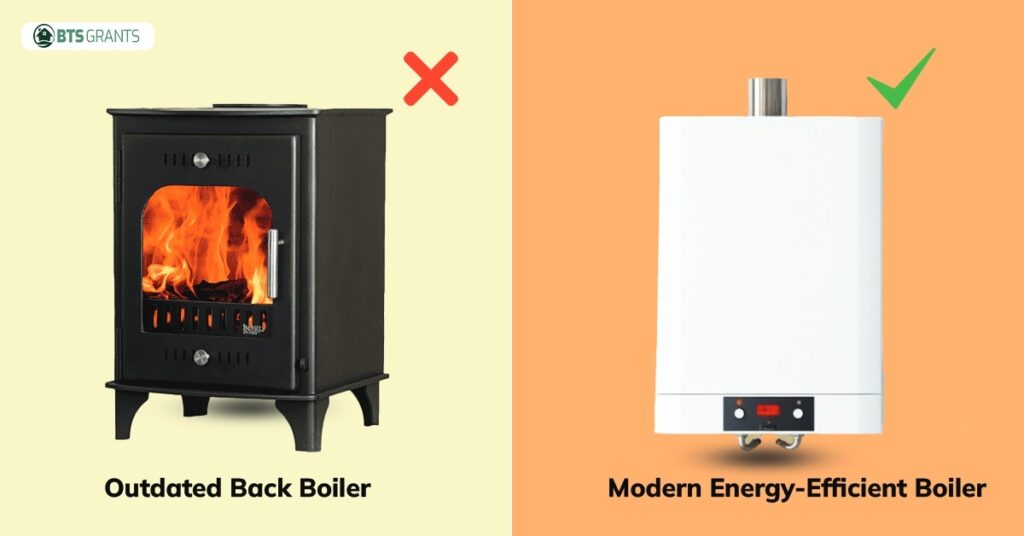
Best Boiler Options to Replace Your Back Boiler
Switching from an outdated back boiler heating system to a modern heating system can reduce your heating costs. Here are three options that I believe are the best:
1. System Boilers
These heat water in a cylinder, making them more appropriate for larger homes because they can enable several taps to be used simultaneously without losing pressure. They’re ideal for homes with higher heating and hot water demands.
2. Combi Boilers
A combi boiler is a compact and efficient unit that can demand heating and hot water without needing a separate tank. You seek a space-efficient and cost-efficient solution if you have a small home.
3. Regular Boilers
Also referred to as conventional or heat-only boilers, they need both a hot-water cylinder and a cold-water storage tank. They are efficient in homes with old radiator systems or heavy water usage.
How can I Apply for a Back Boiler Removal Grant?
Applying for a back boiler removal grant is a straightforward process. Follow these steps to get started:
- Check Eligibility
The process starts with filling out an application form and answering a brief questionnaire. So you will be eligible for the grant. - Prepare Documents
Collect evidence of homeownership, information about your current back boiler, and proof of benefits if you qualify. Once again, proper documentation assures your chances of approval. - Receive an Assessment Call
The expert will then reach out to confirm things like the boiler’s age and whether you’re eligible. Your application will continue after verification. - Home Survey and Installation
A surveyor will visit your property to assess its energy efficiency (EPC rating). If everything is in order, they will arrange to remove your old back boiler and install a new, energy-efficient system.
What Are the Benefits of a Back Boiler Removal Grant?
A back boiler removal grant offers several key advantages for homeowners and tenants. Here’s how it can benefit you:
- Lower Energy Bills: Replacing an old back boiler with a more efficient heating system helps reduce heating costs significantly.
- Improved Energy Efficiency: Modern boilers are far more energy-efficient, helping your home use less energy for heating and hot water.
- Reduced Carbon Emissions: Upgrading to a new boiler helps lower your household’s carbon footprint by reducing energy waste.
- Alleviates Fuel Poverty: A more efficient heating system can help lower fuel bills, easing financial strain on low-income households.
Conclusion
If you want to make your home more energy efficient, cut energy bills, and reduce your home’s carbon footprint, you must replace older boilers. Boiler Removal Grant under the Eco4 boiler replacement scheme, giving financial help to homeowners and tenants in low-income families to improve their heating systems.
Switching to the latest boilers, such as combi, systems, or regular boilers, can increase your home’s comfort, safety, and environmental effects. Not only does taking advantage of this grant help you with sustainable living, but it also helps contribute to the UK’s energy-saving targets.
Whatever the situation—whether looking into eligibility or seeking the right solutions to back boiler replacement—the ECO4 scheme offers a reasonable solution to the problem of obsolete heating. Don’t miss the chance to upgrade your home to be more efficient, eco-friendly, and cost-effective. Apply today and take the first step towards a better heating system.
FAQs:
The back boiler removal grant is part of the ECO4 scheme, a UK government initiative designed to improve home energy efficiency. It assists eligible UK homeowners in replacing old back boilers with energy-efficient systems such as A-rated gas boilers or heat pumps.
Yes, you can replace a back boiler with a modern, energy-efficient system like a combi boiler or system boiler. Eligibility includes an annual income of less than £31,000 or receiving government benefits like Universal Credit or Pension Credit. Homes with low EPC ratings (E, F, or G) are prioritized.
Yep, back boilers were banned in the UK in 2005. Heating technology has improved, and updated safety regulations have made them illegal. It is not illegal to keep using your back boiler if it was installed before 2005. However, we must upgrade the old boiler to a more modern, energy-efficient boiler to mitigate energy costs and safety.
Inefficient: Back boilers are not energy efficient and trail behind their modern combi or system boiler counterparts, which maintain energy efficiency ratings of 92%-94%.
Safety Concerns: Older back boilers can sometimes leak carbon monoxide or cause chimney fires. Repairs are expensive, too, because spare parts are hard to come by.
Better Safety Standards: Modern boilers meet strict safety standards, offering safer and more efficient heating solutions
To qualify for the back boiler removal grant, you must meet the following criteria:
✅ Homeowners or private tenants (with landlord’s permission) are eligible.
✅ You must receive government benefits such as Universal Credit or Pension Credit.
✅The household income should be below £31,000
✅ The property should have a low EPC rating (D, E, F, or G).
The complexity of the installation dictates how long it takes to replace a back boiler. Typically, this process takes 1–3 days to remove the old system, site prep, and install the new boiler or heat pump.
The back boiler replacement cost in the UK typically ranges between £2,500 and £4,500, depending on factors like the type of boiler and necessary pipework. However, when applying for the BTS Grant under the UK government’s ECO4 scheme, eligible households can have their back boiler removed and replaced completely free of charge.
This cost-free service covers both the back boiler removal and installation of a new energy-efficient boiler with no upfront payment required. Our network of accredited installers ensures a seamless process from assessment to installation, providing you with a hassle-free solution while helping to reduce energy bills.
Applying is simple! Just fill out our quick eligibility form, and one of our experts will assess your application. If eligible, our team will arrange a professional survey and installation at zero cost to you.


